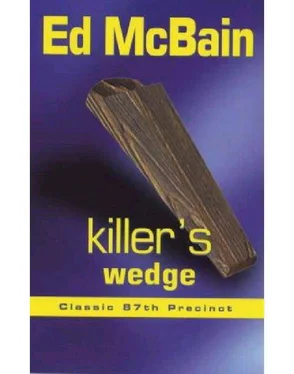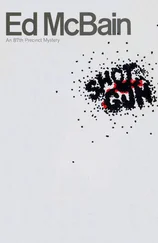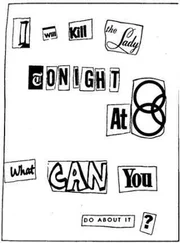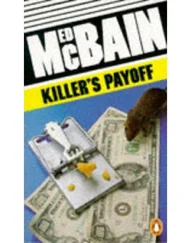McBain, Ed - Killer's Wedge
Здесь есть возможность читать онлайн «McBain, Ed - Killer's Wedge» весь текст электронной книги совершенно бесплатно (целиком полную версию без сокращений). В некоторых случаях можно слушать аудио, скачать через торрент в формате fb2 и присутствует краткое содержание. Жанр: Полицейский детектив, на английском языке. Описание произведения, (предисловие) а так же отзывы посетителей доступны на портале библиотеки ЛибКат.
- Название:Killer's Wedge
- Автор:
- Жанр:
- Год:неизвестен
- ISBN:нет данных
- Рейтинг книги:3 / 5. Голосов: 1
-
Избранное:Добавить в избранное
- Отзывы:
-
Ваша оценка:
- 60
- 1
- 2
- 3
- 4
- 5
Killer's Wedge: краткое содержание, описание и аннотация
Предлагаем к чтению аннотацию, описание, краткое содержание или предисловие (зависит от того, что написал сам автор книги «Killer's Wedge»). Если вы не нашли необходимую информацию о книге — напишите в комментариях, мы постараемся отыскать её.
Killer's Wedge — читать онлайн бесплатно полную книгу (весь текст) целиком
Ниже представлен текст книги, разбитый по страницам. Система сохранения места последней прочитанной страницы, позволяет с удобством читать онлайн бесплатно книгу «Killer's Wedge», без необходимости каждый раз заново искать на чём Вы остановились. Поставьте закладку, и сможете в любой момент перейти на страницу, на которой закончили чтение.
Интервал:
Закладка:
One day, Tamblin thought, I will stop publishing textbooks, and especially mathematics texts. I'll bring out slim volumes of poetry or criticism. Tamblin Books will begin to mean beautiful books.
No more "Given X equals 10, and Y equals 12, what then does / A equal?" No more "Log C equals Log D, therefore ..." No more ulcers.
He felt a twinge even thinking about his ulcers.
Poetry, he thought. Slim beautiful volumes of poetry. Ah, that would be wonderful. I'll move to the suburbs and run the firm from there. No more subways. No more rushing. No more schedules. No more crumby editors fresh from Harvard with Phi Beta Kappa keys hanging on their weskits.
No more disgruntled artists drawing triangles when they want to be drawing mines. I no more doddering professors bringing their creaky goddamn texts into my office. Only beautiful slim volumes of poetry written by young slim girls with golden hair. Ahhhhhh.
Geoffrey Tamblin lived on Silvermine Road at the outer fringes of the 87th Precinct. Every evening, he walked from his office on Hall Avenue in midtown Isola to the subway a block north. He rode the subway up to, Sixteenth, disembarked, and then walked toward his apartment house through a neighborhood which had once been beautiful and quite elite. Now, the neighborhood was going, everything was going, it was the fault of mathematics. The world was reducing everything to simple formulas, there was no reality any more except the reality of mathematics. X times infinity equals a hydrogen explosion. The world would not end in fire-it would end in mathematical symbols.
The neighborhood even smelled bad now.
Empty lots strewn with rubble, garbage thrown from windows, street gangs wearing bright silk jackets and committing murder while the policemen slept, gangsters, all gangsters who were more interested in the mathematics of a crossword puzzle than in human decency. I've got to get out of this, ~ poetry, where is all the poetry in the world?
I'll walk past the park tonight, he thought.
The thought excited him. There was a time, before he'd become involved with a world of X's and Y's, when Geoffrey Tamblin could walk the paths of Grover Park and stare up at an orange ball of moon and know with certainty that the city was a place of romance and mystery. Now-with three ulcers-he thought only that he could not walk through the park because of potential muggers, he would have to walk past it-on Grover, Avenue. And still, the thought excited him.
He walked rapidly, thinking of poetry, noticing the ~ mathematical precision of the green globes hanging outside the police station across the street. 87. Figures. ~ Always figures.
There were three boys walking ahead of him. Juvenile delinquents, gangsters? No, they looked like college boys, potential nuclear physicists, mathematicians. What were' they doing up her'~, all the way uptown?
Listen to them sing, Tamblin thought. Did I ever sing? Wait until they come face to face with the unbending reality of plus and minus. Let's hear them sing then, let's hear them.
Geoffrey Tamblin broke his stride.
His shoe was sticking to the pavement.
Disgustedly, he pulled it loose and examined the sole. Chewing gum! Damnit, when would people learn to be clean, throwing gum all over the sidewalk where a man could step on it.
Swearing under his breath, he looked around for a scrap of paper, wishing he had one of Dr. Fanensel's texts to tear up.
He spotted the blue rectangle of paper lying next to the curb, hobbled over to it, and picked it up. He did not even glance at it. It was probably a throwaway from one of the supermarkets, full of this week's specials, prices, prices, figures, figures, where was all the poetry in the world?
Wadding the blue sheet, he rubbed viciously at the gum on his shoe. Then, pure again, he crumpled the paper into a mathematical ball and threw it down the sewer.
It was probably just as well.
Meyer Meyer's message would have made an exceedingly slim volume of poetry.
""The sun is a-shining to welcome the day,"" sang Sammy, "'and it's hi-ho, come to the fair!"" ""To the fair, to the fair, to the fair,"" Bucky sang.
"How does the rest go?" Sammy asked.
""To the fair, to the fair, to the fair,"" Bucky sang.
"Let's sing a college song," Jim said.
"Screw college songs," Sammy said.
"Lets sing "Minnie the Mermaid."" "I don't know the words."
"Who needs words? It's emotion that counts, not words."
"Hear, hear," Bucky said.
"Words are only words," Sammy said philosophically, "if they don't come from here. Right here." He tapped his heart.
"Where's this Mason Avenue?" Jim wanted to know.
"Where's all these Spanish chicks?"
"Up the street," Sammy said.
"North.
Don't talk so loud. That's a police station over there."
"I hate cops," Jim said.
"Me, too," Bucky said.
"I never met a cop," Jim said, "who wasn't an out-and-out son-of-a-bitch."
"Me, too," Bucky said.
"I hate aviators," Sammy said.
"I hate aviators, too," Bucky said.
"But I hate cops, too."
"I hate, especially," Sammy said, "jet aviators."
"Oh, especially," Bucky said.
"But cops, too."
"Are you still crocked?" Jim asked.
"I'm still crocked and it's magnificent. Where are all the Spanish girls?"
"Up the street, up the street, don't get impatient."
"What's that?" Bucky said.
"What's what?"
"That blue piece of paper. Over there."
"What?" Sammy turned to look.
"It's a blue piece of paper. What do you think it is?"
"I don't know," Bucky said.
"What do you think it is?" They began waliting again, past the second carbon copy of Meyer's message.
"I think it's a letter from a very sad old fart. She uses blue stationery whenever she writes to her imaginary lover."
"Very good," Bucky said. They continued walking.
"What do you think it is?"
"I think it's a birth announcement from a guy who always wanted a boy. Only he got a girl by accident, but all the announcements were already printed on blue."
"Very good," Sammy said.
"What do you think it is, Jim?"
"I'm crocked," Jim said.
"Yes, but what do you think it is?"
They continued walking, half a block away from the message now.
"I think it's a blue piece of toilet paper," Jim said.
Bucky stopped walking.
"Let's check."
"Huh?"
"Let's see."
"Come on, come on," Jim said, "let's not waste time. The tamales are waiting."
"Only take a minute," Bucky said, and he turned to go back for the sheet of paper.
Jim caught his arm.
"Listen, don't be a nut," Jim said.
"Come on."
"He's right," Sammy said.
"Who care what the damn thing is?"
"I do," Bucky said, and he pulled his arm free, whirled, and ran up the street.
The other boys watched him as he picked up the sheet of paper.
"Crazy nut," Jim said.
"Wasting our time."
"Yeah," Sammy said.
Up the street, Bucky was reading the sheet. Suddenly, he broke into a trot.
"Hey!" he shouted.
"Hey!"
Teddy Carella looked at her wrist watch.
It was 6:45.
She walked to the curb, signaled for a cab, and climbed in the moment it stopped.
"Where to, lady?" the cabbie asked.
Teddy took a slip of paper and a pencil from her purse. Rapidly, she wrote "87th Precinct, Grover Avenue" and handed the slip to the driver.
"Right," he said, and put the taxi in gear.
CHAPTER I5
Alf Miscolo lay in delirium, and in his tortured he cried out, "Mary! Mary!"
His wife's name was Katherine.
He was not a handsome man, Miscolo.
He lay on the floor now with his head propped against Willis' jacket. His forehead was drenched with sweat which rolled down the uneven planes of his face. His nose was massive, and his eyebrows were bushy, and there was a thickness about his neck which created the impression of head sitting directly on shoulders. He was not a handsome man, Mis-cob less handsome now in his pain and his delirium. Blood was seeping through the sulfanilamide bandage, and his life was leaking out of his body drop by precious drop, and he cried out again "Mary!" sharply because he once had been in love.
Читать дальшеИнтервал:
Закладка:
Похожие книги на «Killer's Wedge»
Представляем Вашему вниманию похожие книги на «Killer's Wedge» списком для выбора. Мы отобрали схожую по названию и смыслу литературу в надежде предоставить читателям больше вариантов отыскать новые, интересные, ещё непрочитанные произведения.
Обсуждение, отзывы о книге «Killer's Wedge» и просто собственные мнения читателей. Оставьте ваши комментарии, напишите, что Вы думаете о произведении, его смысле или главных героях. Укажите что конкретно понравилось, а что нет, и почему Вы так считаете.












